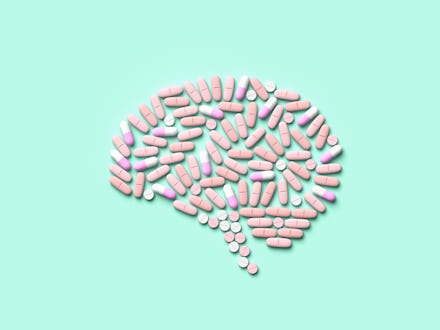SAMe is hyped as a miracle supplement for depression. But does it actually work?

Because some of us like to opt for more “natural” treatments before we hit the hard stuff, there are hundreds of supplements out there claiming to treat different types of mental illness. Although prescribed medication and talk therapy has proven to work best so far, we don’t judge. One of the more popular remedies for depression is a nutritional supplement called SAMe (or SAM-e) that people take as an alternative to traditional antidepressants. Now, just because something isn’t a drug doesn’t mean it doesn’t come with side effects; a friend recently recounted that when she was trying SAMe, she sometimes felt sort of comatose. I don't know about you, but that's not really what I'm looking for in an antidepressant — or any other supplement for that matter. Proponents, however, claim that SAMe can combat depression even better than pharmaceuticals. All our bodies function differently, of course, but is there any truth to that claim?
What is SAMe, exactly?
First of all, SAMe — known more formally as S-adenosyl-L-methionine — is actually a naturally occurring compound produced in our livers that maintains cell membranes in the body and also helps produce and regulate hormones. Researchers are still learning about the chemical, but it’s believed that although we usually make all the SAMe we need, some illnesses may reduce the amount that the body makes, as will having low levels of some amino acids, folate, or vitamin B12. The SAMe supplements that we find on shelves are essentially synthetic versions of the compound, made in a lab.
In some parts of Europe, SAMe is treated as a prescription medication that is used to treat depression, osteoarthritis, and liver disease. It works by activating the release of biochemicals — like the neurotransmitters serotonin and dopamine — which help regulate mood. Unlike pharmaceutical antidepressants, which extend the amount of time neurotransmitters like serotonin stay in the body, SAMe prompts the body to make more neurotransmitters. All of this is pretty cool, but do we need to be taking SAMe supplements, and are they safe?
How does it work against depression?
“SAMe can be very effective,” says Tara Scott, an Ohio-based physician who specializes in hormone issues. It has been shown to help sleep, energy, and depression, Scott says. But, like most medicine, SAMe is not a one-size-fits-all option. The problem with taking SAMe supplements is that your dose depends on your individual genetic makeup, says Scott. How your body responds to SAMe varies depending on how your body metabolizes neurotransmitters, Scott explains.
Scott breaks it down for those of us who aren’t that savvy in science. We all have a gene that makes an enzyme that helps metabolize chemicals in your brain, Scott says. That gene and the enzyme it makes are called COMT, Scott says, and it helps get rid of dopamine (your motivation chemical, to put simply) and epinephrine (your alertness chemical). Some people, she explains, use COMT to get rid of serotonin and epinephrine quickly and some do not.
How quickly your body metabolizes — uses and disposes of — those biochemicals determines how taking SAMe will make you feel, Scott says. In other words, if your body uses up and gets rid of the chemicals that make you feel motivated and alert quickly, SAMe could make you feel low energy. And it could have the opposite effect if your body metabolizes neurotransmitters slowly. So, while Scott thinks that SAMe can be effective in treating depression, she says that the dosage is going to vary from person-to-person.
Is it safe to take?
So, if you’re going to try SAMe, you should probably consult to your doctor or a hormone expert first. The good news is that if you decide to experiment with OTC SAMe supplements, they don’t generally have severe adverse side effects. But some people are allergic, and folks with mental health issues should be aware that SAMe can trigger mania. Also, SAMe does not mix well with antidepressants or many other psychopharmaceuticals and supplements, so be careful.
Most of the studies on SAMe are pretty small, so there is some, but not a ton of, clinical evidence to bolster the claims of SAMe supplements. But the truth is that it’s hard for a lot of scientists to get the money needed to do trials on inexpensive treatments that can’t be controlled by Big Pharma. Based on the facts that doctors say the scientific logic behind SAMe is sound, it’s been used safely in Europe for years, and has very few side effects, I’m going to call SAMe health with a touch of hype and put it in my shopping cart right now.